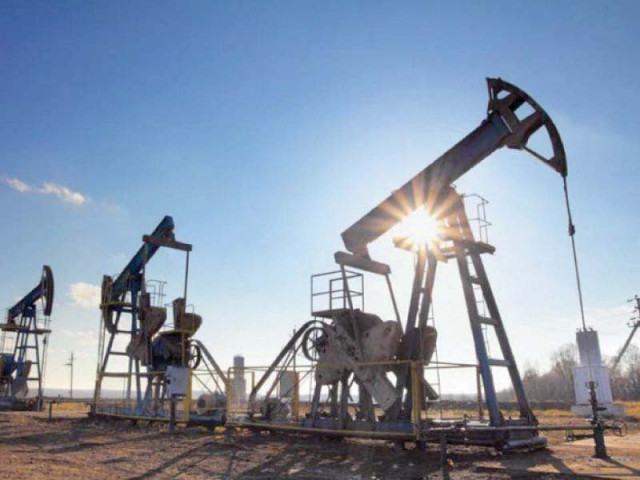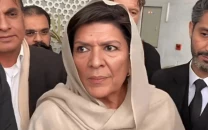Pakistan has 10,159 tcf of shale gas deposits: USAID
Country also holds reserves of 2.3t barrels of oil, shows study

According to the petroleum minister, 70% of data was used to develop the study and samples were sent to the New Tech laboratory in Houston, US for assessment. PHOTO: FILE
Pakistan has massive deposits of 10,159 trillion cubic feet (tcf) of shale gas and 2.3 trillion barrels of oil - estimates that are several times higher than figures given by the US Energy Information Administration (EIA), reveals a study conducted with the help of US Agency for International Development (USAID).
EIA had reported in April 2011 that 206 tcf of shale gas was present in the lower Indus Basin, of which 51 tcf were technically recoverable.
Rajgarh: Gas and water supply issues hot on the agenda
However, in June 2013, EIA revised the estimate upwards to 586 tcf, of which 105 tcf were tipped as technically recoverable. Apart from gas, EIA also saw the presence of 9.1 billion barrels of shale oil that were technically recoverable out of the estimated deposits of 227 billion barrels.
Speaking at a press conference, Petroleum and Natural Resources Minister Shahid Khaqan Abbasi said the study was undertaken with the support of USAID in January 2014, and was completed in November this year.
He said the study confirmed that Pakistan had 10,159 tcf of shale gas and 2,323 billion barrels of oil reserves.
Iran has not much gas for sale, Pakistan must act swiftly
“Risked technically recoverable resource is 95 trillion cubic feet of shale gas and 14 billion barrels of shale oil,” Abbasi said, adding the data of 1,611 wells had been collected and shale formation of 1,312 wells was done through drilling.
He said 70% of data was used to develop the study and samples were sent to the New Tech laboratory in Houston, US for assessment. “Pakistan has the potential to produce shale gas and oil, which is more than expectations,” he remarked.
Abbasi insisted that the technology in Pakistan for exploring conventional oil and gas deposits could also be used for extracting shale reserves. Still, more technology was required for producing shale oil and gas on a large scale.
China-funded LNG project to turn into Iran-Pakistan gas pipeline: petroleum minister
He cited environmental issues, provision of water and high cost of drilling as the real challenges. A well requires 3 to 8 million barrels of water.
“We have water but the real issue is its disposal,” he said, adding shale gas would cost $10 per million British thermal units. However, the cost will come down with the increase in recovery of untapped deposits.
He said the world was exploring shale gas and oil and Pakistan also wanted to harness that potential. “We have asked OGDC (Oil and Gas Development Company) and PPL (Pakistan Petroleum Limited) to extract shale gas and oil from a well in order to determine its cost.”
A policy for shale deposits will be formulated after the cost of drilling is determined.
Winter is coming, gas supply is going
According to Abbasi, Pakistan has 20 trillion cubic feet of conventional gas and 385 million barrels of oil. “Gas is enough to meet the needs for 15 years at the existing pace of production,” he said.
Adviser to Ministry of Petroleum Zaid Muzaffar revealed that OGDC was working on one conventional gas well in a bid to find shale gas and oil. “We hope it will get results in two to three months.”
A well needs $2 to $3 million of additional cost to reach the shale reserves.
Gas supply in winter
Abbasi said gas would be available in Punjab to domestic consumers only and liquefied natural gas (LNG) would be consumed to run power and fertiliser plants.
Pakistan, Russia sign gas pipeline agreement
Compressed natural gas (CNG) stations may get LNG if it was available and captive power plants would also be switched to this fuel, he said.
The minister stressed that the petroleum ministry had followed a transparent process in the award of LNG contract. It has provided all information to the National Accountability Bureau, which has asked for a presentation.
He revealed that the ministry had sent a summary to the Economic Coordination Committee for deregulating oil prices, but it was turned down. “We are looking at the petroleum situation again to assess whether it should be deregulated or not.”
Published in The Express Tribune, November 20th, 2015.
Like Business on Facebook, follow @TribuneBiz on Twitter to stay informed and join in the conversation.



















COMMENTS
Comments are moderated and generally will be posted if they are on-topic and not abusive.
For more information, please see our Comments FAQ